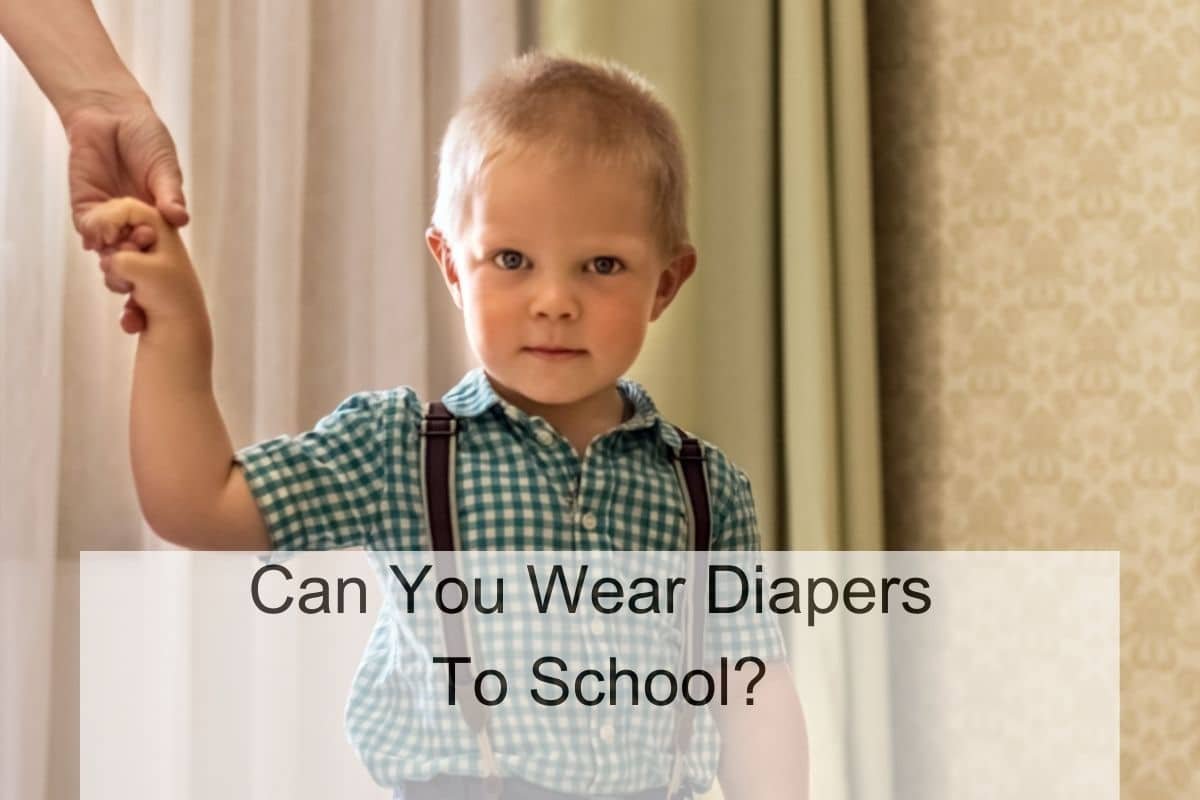As a parent, I understand that sending your child to school wearing diapers can be a concern. It is natural to worry about your child’s comfort and well-being. However, there are situations where wearing diapers to school is necessary and acceptable.

For instance, if your child has a developmental delay, disability, or medical condition that requires them to wear diapers, it is perfectly acceptable to send them to school with whatever they need to be comfortable. In such cases, it is important to communicate with the school and the teacher to ensure that your child’s needs are met.
On the other hand, if your child is not medically required to wear diapers, it is important to encourage and support them in their potty training journey. Potty training can be a challenging process, but with patience, consistency, and positive reinforcement, your child can successfully transition out of diapers. It is important to remember that every child is different, and there is no set timeline for potty training.
Understanding the Need for Diapers in School

As a loving parent, I understand that wearing diapers to school can be a sensitive topic for both the child and the parents. However, it is important to understand that some children have a medical condition that causes them to require the use of diapers.
In some cases, children may have a medical condition such as urinary incontinence or an overactive bladder, which can cause them to have accidents throughout the day. Wearing diapers can help prevent embarrassment and discomfort for the child, as well as help them to maintain their dignity.
It is also important to note that wearing diapers to school does not necessarily mean that the child is not potty trained. Some children may have difficulty with bladder control, even after being potty trained. In these cases, wearing diapers to school can help prevent accidents and allow the child to focus on their education without worrying about bathroom breaks.
As a parent, it is important to work with the child’s healthcare provider and school administrators to ensure that the child’s needs are being met. This may include providing extra diapers or pull-ups for the child to use throughout the day, as well as ensuring that the child has access to a private bathroom when needed.
Legal and Policy Considerations

As a loving parent, I understand that it can be challenging to decide whether or not to allow your child to wear diapers to school. There are many legal and policy considerations to keep in mind when making this decision. In this section, I will outline some of the key points to consider.
Education Laws
Under federal law, students with disabilities are entitled to a free and appropriate public education (FAPE) in the least restrictive environment possible. This means that if your child has a disability that requires them to wear diapers, the school must make reasonable accommodations to ensure that they can participate in school activities. However, it is important to note that not all students who wear diapers have a disability, and the school may not be required to make accommodations in those cases.
School Policies on Personal Care Items
Most schools have policies in place regarding personal care items, including diapers. These policies vary from school to school, so it is important to check with your child’s school to see what their policy is. Some schools may require that parents provide a doctor’s note stating that the child needs to wear diapers, while others may allow it without a note. Additionally, some schools may have restrictions on the type of diaper that can be worn, such as requiring that they be disposable rather than cloth.
It is important to keep in mind that while the school may have policies in place regarding diapers, they may not be able to enforce those policies if they conflict with federal or state law. If you feel that your child’s rights are being violated, it may be necessary to seek legal assistance to ensure that they receive the accommodations they are entitled to.
Health and Medical Conditions

As a loving parent, I understand that some children may need to wear diapers to school due to health and medical conditions. In such cases, it is important to ensure that the child is comfortable and their needs are met.
Incontinence Issues
Children who suffer from incontinence issues may need to wear diapers to school. Incontinence can be caused by a variety of medical conditions such as bladder or bowel problems, spinal cord injuries, or developmental delays. It is important to work with the child’s healthcare provider to address the underlying cause of the incontinence and develop a plan to manage it.
In the meantime, providing the child with comfortable and absorbent diapers can help them feel more confident and less self-conscious. It is also important to make sure that the child has access to a private and clean place to change their diaper as needed.
Special Needs Circumstances
Children with special needs may also require diapers to be worn to school. For example, children with autism or sensory processing disorders may have difficulty recognizing the need to use the bathroom or may be resistant to using the toilet. In such cases, wearing a diaper can help prevent accidents and provide a sense of security for the child.
It is important to work with the child’s healthcare provider and school staff to develop a plan that meets the child’s needs. This may include providing the child with a sensory-friendly bathroom, allowing them to wear comfortable clothing that accommodates their diaper, and ensuring that they have access to a private and clean place to change their diaper as needed.
Social and Emotional Impacts

As a loving parent, I understand the importance of social and emotional well-being for my child. Wearing diapers to school can have both positive and negative impacts on a child’s social and emotional development. In this section, I will discuss the potential effects of wearing diapers to school and how parents can support their children.
Bullying and Stigmatization
Wearing diapers to school can make children vulnerable to bullying and stigmatization. Other children may tease or make fun of them, causing emotional distress and lowering their self-esteem. As a parent, it is important to talk to your child about the potential risks and how to handle them. Encourage your child to speak up and seek support from teachers or school counselors if they experience bullying or teasing.
Support and Inclusion
On the other hand, wearing diapers to school can also promote support and inclusion. Children with special needs or medical conditions may require diapers for their health and well-being. By allowing them to wear diapers to school, we promote a more inclusive and accepting environment. As a parent, it is important to advocate for your child’s needs and work with the school to ensure they receive the support they need.
Practical Guidance for Students and Parents
As a parent, I understand that dealing with incontinence can be challenging for both students and parents. However, with the right guidance, it is possible to manage diaper use discreetly and with confidence. In this section, I will provide practical guidance for students and parents who are dealing with incontinence.
Choosing the Right Diapers
Choosing the right diapers is essential for students who need to wear them to school. It is important to choose diapers that are comfortable, absorbent, and discreet. There are many different types of diapers available, so it is important to choose the right ones for your child’s needs.
When selecting diapers, consider the size, absorbency, and comfort level. It is important to choose diapers that fit well and are not too tight or too loose. A diaper that is too tight can cause discomfort, while a diaper that is too loose can leak.
Managing Diaper Use Discreetly
Managing diaper use discreetly is important for students who wear diapers to school. It is essential to change diapers frequently to avoid leaks and odors. It is also important to have a plan in place for discreetly disposing of used diapers.
Students who wear diapers to school should have a designated place to change and dispose of used diapers. This can be a private bathroom or a designated area in the nurse’s office. It is also important to have a supply of clean diapers and wipes on hand.
Communication with School Staff
Communication with school staff is important for students who wear diapers to school. It is important to inform the school staff of your child’s condition and needs. This will help the school staff provide the necessary support and accommodations.
Parents should communicate with the school staff about their child’s condition and needs. This includes informing the school staff of the type of diapers your child uses, how often they need to be changed, and where they should be disposed of. It is also important to discuss any concerns or issues with the school staff and work together to find solutions.
Resources and Support
As a loving parent, I understand that wearing diapers to school can be a difficult experience for your child. However, there are many resources and support networks available to help your child cope with this situation.
Parental Support Networks
Talking to other parents who are going through the same experience can be a great source of comfort and advice. There are many online support groups and discussion boards where parents of children who wear diapers to school can connect and share their experiences. One such resource is the National Diaper Bank Network, which provides diaper assistance to families in need.
Educational Resources
It’s important to educate your child’s teachers and school administrators about your child’s condition. This can help ensure that your child has access to the resources they need, such as extra bathroom breaks and a private place to change their diaper. The National Association for Continence provides educational resources and support for individuals with incontinence, including a guide for school administrators and teachers on how to support students who wear diapers to school.

